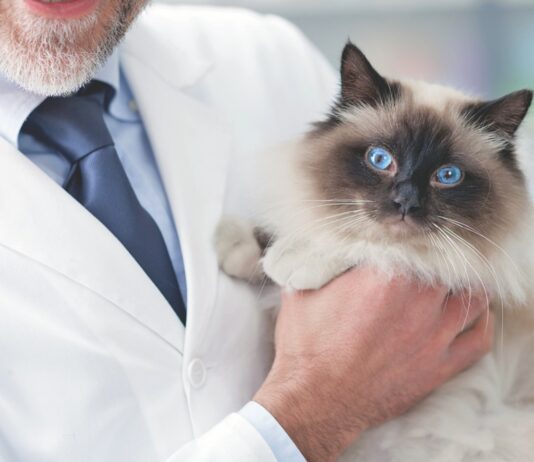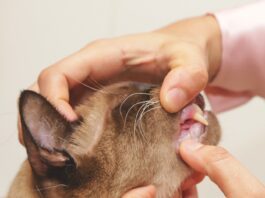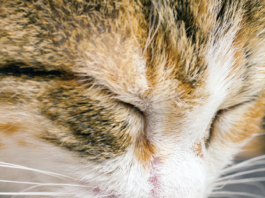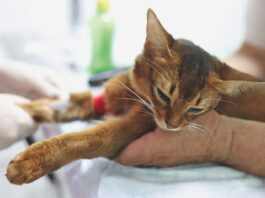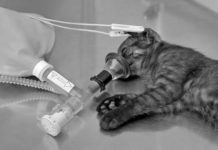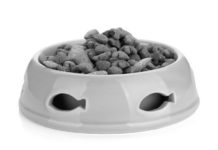In The News: February 2015
By far the most common heart disease in cats is hypertrophic cardiomyopathy (HCM). The characteristic thickening of the muscle of the left ventricle seen with HCM affects the hearts ability to pump blood. One complication is that blood clots form and dislodge from the heart and block blood flow in large arteries. The clots cause pain, nerve and muscle damage, and can lead to death. Treatment today is only minimally effective.A study led by Fern Tablin, VMD, Ph.D., at UC Davis will analyze the activation of blood platelets - cells that help blood clot - in cats with HCM with the goal of early detection of the disease. Many affected cats show no signs. Others have labored or rapid breathing and lethargy.
Anesthesia Presents Fewer Risks Today
If your cat needs to have anesthesia, you can rest easier about the procedure because it poses fewer risks today, thanks to newer drugs, precise monitoring and an increased number of board-specialized veterinarians.Our discipline has evolved, says Luis Campoy, LV CertVA, MRCVS, Section Chief of Anesthesiology at Cornell University College of Veterinary Medicine.
Beyond the Guidelines and Checklists
Guidelines from the American Veterinary Medical Association understandably take an objective approach to euthanasia: When animals are plagued by disease that produces insurmountable suffering, it can be argued that continuing to live is worse for the animal than death … The humane disposition is to act for the sake of the animal or its interests, because … the animal will be relieved of an unbearable burden.
Life-Saving Screening for Hemophilia
Advances in veterinary medicine and an increase in animal blood banks have improved the diagnosis and treatment of hemophilia to the extent that some cats who once would have died from the life-threatening disorder can now live full lives.
Ask Elizabeth: January 2015
My 12-year-old cat has hyperthyroidism. She cannot tolerate methimazole, and I have tried special food (she didnt like it), homeopathic treatments, dietary additives and even consulted an animal psychic. Nothing has an effect, and I dont want to put her through surgery or radioactive iodine therapy. They both sound horrible and also too expensive. Have we run out of options?
How Mutated Genes Pass To The Next Generation
Hemophilia occurs as a result of genetic mutation, and once it develops, it can be transmitted to a cats offspring. Because female carriers are asymptomatic (meaning they dont show any symptoms), it can be challenging to identify them to avoid passing the hemophilia mutation onto the next generation.
Short Takes: January 2015
In little more than a decade, changes have taken place in veterinary medicine to help prevent cats developing malignant tumors at the site of certain vaccinations. However, 22,000 cats in the U.S. still develop injection site-associated sarcomas (ISAS) every year, and the tumors are often more aggressive and prone to recurrence than spontaneous ones.
In The News: January 2015
In little more than a decade, changes have taken place in veterinary medicine to help prevent cats developing malignant tumors at the site of certain vaccinations. However, 22,000 cats in the U.S. still develop injection site-associated sarcomas (ISAS) every year, and the tumors are often more aggressive and prone to recurrence than spontaneous ones.
Where To Find Help
These pet loss support hotlines are among those available:
Theyre Giving Kittens a Chance at Life
Of all the animals in shelters, young kittens are usually the most at risk. Theyre fragile, prone to infectious illnesses and have special care needs. While some are placed in foster homes to be hand-raised until they are old enough for adoption, many shelters euthanize them as soon as they are brought in because they dont have the infrastructure or staff to care for them.
Reducing the Risk of Food-borne Illness
Demystifying the ingredients in commercial food is only one step in providing a healthy diet for our cats. The ongoing challenge is preventing the spread of food-borne illness to animals and people in the household. At last count, manufacturers had recalled five of six dog and cat foods this year because of possible contamination with the bacteria salmonella. The sixth recalled food was suspected of containing the bacteria Listeria monocytogenes that can also cause serious infection in humans and animals.
Looking Beyond the Ingredient Label
In our quest to eat healthy food, we often extend that enthusiasm to our cats. We evaluate their diets with the same scrupulous care we give our own, but commercial cat food can still remain somewhat of a mystery. We question if preservatives are safe. Should we avoid genetically modified ingredients? What about artificial coloring?

